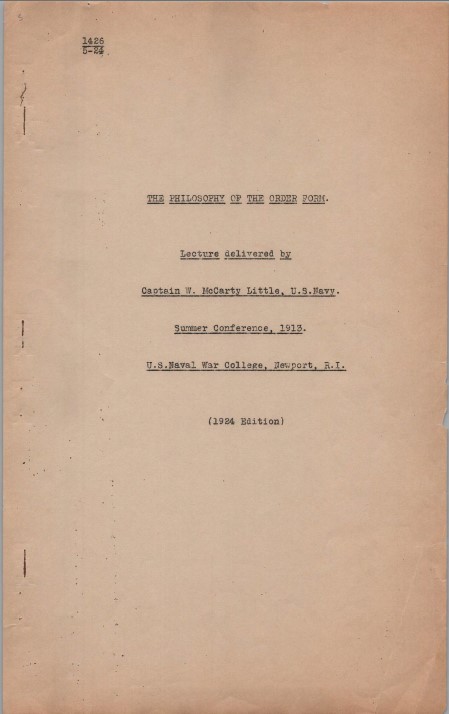McCarty Little, William, 1845-1915
Found in 14 Collections and/or Records:
NWC Summer Conference group portrait, circa 1911
10x9 photo of attendees at 1911 Summer Conference. The photo was taken on front steps of Luce Hall.
The Philosophy of the Order Form, 1913
College curriculum items, including orientation materials, lectures, addresses, tactical, strategic, demonstrative, scouting and screening and operational problems, maneuver rules, fire effect diagrams, quick decision problems, directives, manuals, articles, historical presentations compiled by members of the Department of Intelligence on naval battles, and translations of the War at Sea, 1914–1918, and miscellaneous NWC publications.
The Philosophy of the Order Form (1924 Edition), 1924
A revised version of a lecture delivered by William McCarty Little during the Summer Conference, 1913. The lecture begins with the central motto, "Whatsoever you take in hand, remember the end, and you will never do amiss," which encapsulates the essence of the lecture. The lecture details the structure and importance of an operation order, emphasizing the "End-in-View" as the guiding objective for any action. It explores the trinity in man and nature — head, heart, and muscle — highlighting their roles in organization and execution. Definitions of key concepts such as mission, objective, and decision are provided to clarify their use in military contexts. The lecture underscores the significance of solidarity, mutual support among agents of execution, and the necessity of keeping the mission's end goal in focus to prevent selfishness and misdirected energy. Examples, including the War College’s influence, illustrate successful application of these principles, culminating in the assertion that recognizing and adhering to the end-in-view is crucial for overcoming challenges and achieving coherent, effective action.

